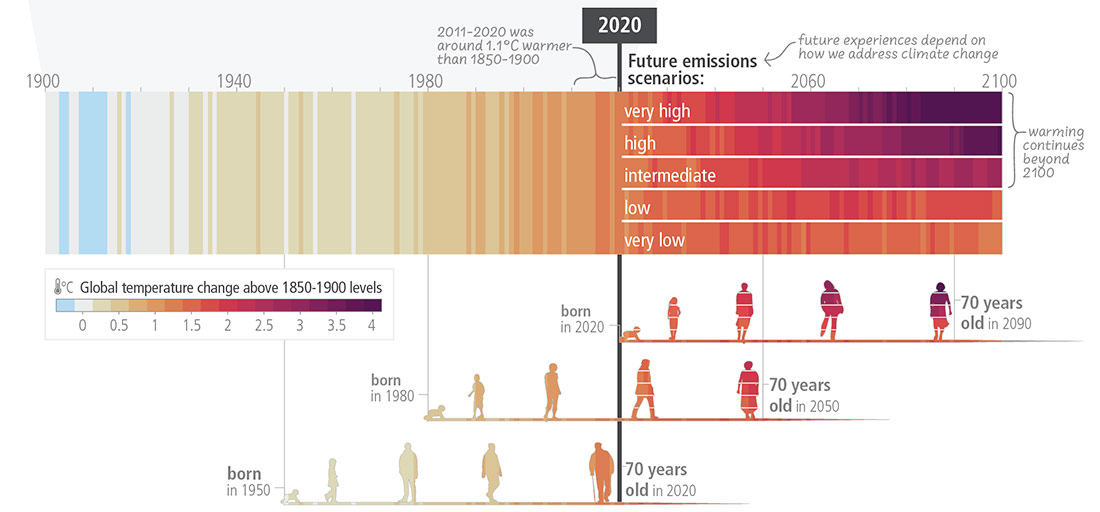ARVE Error: src mismatch
url: https://youtu.be/T0REe-yqo_c
src in: https://www.youtube-nocookie.com/embed/T0REe-yqo_c?feature=oembed&enablejsapi=1&origin=https://lab.cccb.org
src gen: https://www.youtube-nocookie.com/embed/T0REe-yqo_cActual comparison
url: https://youtu.be/T0REe-yqo_c
src in: https://www.youtube-nocookie.com/embed/T0REe-yqo_c?enablejsapi=1&origin=https%3A%2F%2Flab.cccb.org
src gen: https://www.youtube-nocookie.com/embed/T0REe-yqo_c
Fighting climate change is about more than just saving polar bears (although that is also part of it). Global warming is affecting human lives and the ecosystems that sustain them. Extreme events such as floods, cyclones and forest fires have already become more frequent. The latest report by the UN panel of experts warns that, at current levels of greenhouse gas emissions, an average temperature increase of 4.4°C would be reached by the end of this century. Francisco J. Doblas Reyes, IPCC author and Director of Earth Sciences at the Barcelona Supercomputing Center, stresses that this is an avoidable future.
“We are walking when we should be running”. This is how Hoesung Lee, Chair of the Intergovernmental Panel on Climate Change (IPCC), referred to the action being taken to confront the climate emergency at the press conference to present the synthesis report that concludes the Sixth Assessment Cycle started in 2015. “Not only are we not running, we are actually walking backwards, because in some cases we are not even cutting down greenhouse gas emissions associated with human activity”, adds physicist Francisco J. Doblas Reyes, Director of the Earth Sciences Department at the Barcelona Supercomputing Center (BSC).
This latest IPCC publication boils down more than 10,000 pages of scientific evidence into a 36-page summary aimed at governments, businesses and anyone with power to make decisions to mitigate emissions from the burning of fossil fuels – gases that have caused an excess of energy in the earth system that warms the planet. The IPCC authors are voluntary, unpaid experts in different fields from 195 countries who are commissioned by the UN to assess climate change every seven years. The synthesis report considers different scenarios between now and the end of the century, with a range of 1.5°C to 4.4°C warming of the Earth’s average temperature compared to the pre-industrial era.
Global warming over several generations

Future projections (2021-2100) of global surface temperature changes under different greenhouse gas emission scenarios. Source: IPCC
However much the deniers insist on politicising the issue, the scientific consensus is resounding and free from ideologies: “Climate change is happening right now, it’s not a future event. And the evidence that human action is responsible for the climate change we’ve seen so far is unequivocal”, Doblas stresses. He has been studying climate for more than three decades in different institutions and is well acquainted with the workings of the IPCC, having been the lead author of the fifth and sixth Assessment Reports. He currently works at the Barcelona Supercomputing Center, home to the MareNostrum, one of the most powerful supercomputers in Europe. Thanks to this technology, Doblas leads a multidisciplinary team that includes engineers, physicists and mathematicians in analysing large amounts of data to generate climate forecasts. This is applied science at the service of sectors such as agriculture, water management, renewable energies and public health.
Protecting the ocean and eating less red meat are necessary measures
“We often think of climate change as an ecological problem. When it’s dealt with in the news, it’s through people in the field of environmentalism, who say very sensible things, but this ends up giving the impression that it’s a matter of saving bears in the Arctic or ducks in Doñana. And, as much as I appreciate the problems that are being faced in these two areas, it seems to me that the message falls short: it’s an economic and social problem… It’s a problem of what place we want to occupy in the world as a society in 10, 20 or 50 years’ time”. Despite incongruities, such as the fact that last year saw an all-time high in public subsidies for fossil fuel consumption in the context of the Russian invasion of Ukraine, the climatologist highlights the hope offered by the energy transition. “We have a unique opportunity to transform society into one that is much fairer, more competitive, and that gives a voice to those who can take advantage of this transformation”. However, he believes that the deployment of renewables must be consensual and take into account the fact that “rural areas are home to people who appreciate their surroundings”.
This decade will be key in deciding the future of the climate and of human wellbeing. The so-called “carbon budget” is running out and the IPCC estimates that greenhouse gas emissions must peak by 2025 at the latest in order to achieve the Paris Agreement target of keeping to the threshold of 1.5°C warming. Experts recommend a series of measures to be implemented in the short term to attain this. Effective conservation of 30-50% of land, freshwater and ocean areas is vital (the ocean has so far absorbed 90% of global warming), and it is also urgently necessary to deploy renewable energies; promote public transport, active mobility and decarbonise transport and industry; improve the energy efficiency of households; modify the food production system and cut down red meat consumption. “We’re talking about a complete transformation of the socio-economic system as we know it”.
The Mediterranean, a climate crisis hotspot
In the coming years, temperature records will be constantly broken at different latitudes around the globe. Half of the world’s population, between 3.3 and 3.6 billion people, live in contexts that are highly vulnerable to climate change. After the Arctic, the Mediterranean is the second most affected area in the world, with drought and rising sea levels as the main threats facing its basin. “The critical factor is the availability of water”, says Doblas, who warns that reservoirs will be emptier in the coming years. “We will have less water not only because it will rain less and more water will be used, but also because there will be less surface water due to evaporation”. However, those who are suffering the worst consequences of climate change are the populations of the Global South, who hold the least responsibility for the situation and also have the least resources to adapt to it.
The degree of warming by the end of this century is “yet to be decided”. Every tenth of a degree counts. The higher the temperature rises, the more exponential the consequences and the more exposed the planet will be to irreversible adverse impacts. Scientists have made their diagnosis and have outlined what needs to be done to stop what UN Secretary General António Guterres has called a “climate time-bomb”. There will be no more IPCC reports until the end of 2030, by which time emissions should have almost halved. “Limiting the impacts of warming is in our hands as a global society, it depends on the decisions we make”, Doblas concludes. It remains to be seen whether multilateralism will succeed in stepping up climate action for a more habitable planet and a fairer future.




Leave a comment